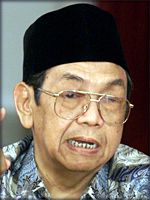CSPE Links
 Timor
Timor
 Cuba
Cuba
 Global Warming
Global Warming Africa I
Africa I  Argentina
Argentina  The Courts
The Courts  US Presidency
US Presidency  ASTI Strike
ASTI Strike  Attack
on America
Attack
on America

The mountainous regions in the centre of East Timor
became home to many of the resistance fighters.
On the 30 August 1999, 78.5% of the population voted to secede from Indonesia, i.e they voted for independence. The United Nations (UN) oversaw the elections to make sure everything was done fairly.
Indonesian soldiers and pro-Indonesian militias retaliated immediately by slaughtering civilians and burning towns to the ground. One third of the population had to flee. Many ended up in camps in West Timor which is part of Indonesia. Many men fled and hid in the mountains. President Habibie and the head of the army, General Wiranto, did not intervene. The militias had been trained by the army and were then allowed to run amok.

Only after enormous international pressure did Indonesia allow a UN peacekeeping force to enter East Timor on 12 September 1999. This force was lead by Australia and very quickly order was restored. Gradually people have started to return to their homes.
Habibie didn't last long being replaced by Wahid (pictured right) in the Indonesian elections.


Xanana

Horta

Belo